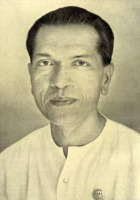Tribhuvandas Luhar
| Tribhuvandas Luhar | |
|---|---|
 |
|
| Born | Tribhuvandas Purushottamdas Luhar 22 March 1908 Bharuch, Gujarat, India |
| Died | 13 January 1991 (aged 82) |
| Occupation | Writer |
| Nationality | India |
| Genre | Poetry, short stories, criticism |
| Notable awards | Ranjitram Suvarna Chandrak |
Tribhuvandas Purushottamdas Luhar, better known by his pen name Sundaram (Devnagri:सुन्दरम, Gujarati:સુન્દરમ) (22 March 1908 – 13 January 1991), was a Gujarati poet and author from India.
He was born on 22 March 1908 at Miyan matar, Bharuch, Gujarat, India. He completed his primary education in local school of Matar and five grades in English medium at Amod, Gujarat. Later he studied at Chhotubhai Purani's Rashtriya New English School, Bharuch. He graduated in languages from Gujarat Vidyapith, Ahmedabad in 1929. He started teaching in Gurukul at Songadh. He participated in Indian independence movement and was imprisoned for some time. He was associated with Jyotisangh, the women's organisation in Ahmedabad, from 1935 to 1945. He was introduced to Sri Aurobindo in 1945 and he moved to Pondicherry. He presided Gujarati Sahitya Parishad in 1970. He died on 13 January 1991.
Though he started with poetry, he successfully ventured into other field of literature. His poetry and prose both are imaginative, intense and full of brilliance. His works have also spiritual as well as social elements. His transition from different philosophical phases; progressivism, communism, Gandhian philosophy and self realisation philosophy of Aurobindo; are evident in his works.
He started writing poetry in 1926 under pen name, Marichi and Ekansh De was his first poem followed by more poems under pen name, Vishwakarma. He published his poem Bardoline in 1928 under pen name, Sundaram and adopted it for lifetime.
Koya Bhagatni Kadvi Vaani ane Garibo na Geeto (1933) was his first poetry collection followed by Kavyamangala (1933). He published another collection Vasudha (1939) and the collection of children's poetry, Rang Rang Vadaliya (1939). His Yatra (1951) is influenced by the philosophy of Aurobindo.
...
Wikipedia
